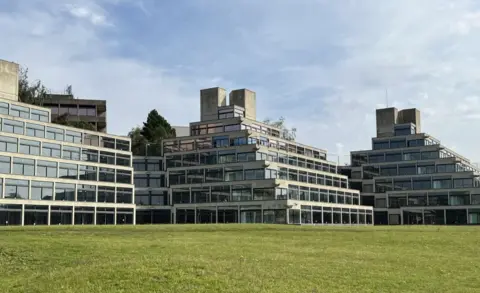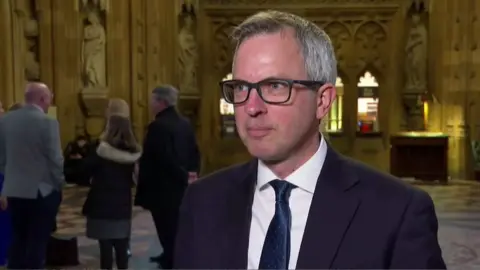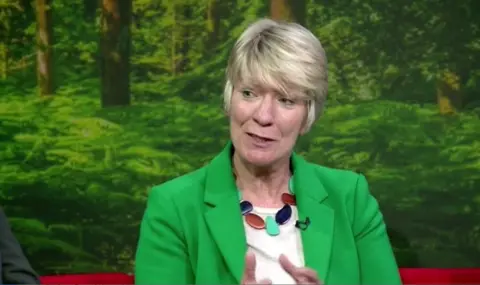University's finances hit by 40% drop in overseas students
 University of East Anglia
University of East AngliaA university's finances have been hit by a 40% drop in international students following a tightening of restrictions, its vice-chancellor said.
David Maguire, of the Norwich-based University of East Anglia, said many colleges were being put in "serious financial difficulty" by the loss of overseas students.
At the beginning of the year the government tightened restrictions on international students, meaning they could no longer bring family members to the UK.
The government said university admissions should not be used "as a gateway to immigration".
 Martin Barber/BBC
Martin Barber/BBCDavid Maguire, vice-chancellor of the University of East Anglia, said overseas students were crucial.
He said the present restrictions on families of international students coming to the country had already had a "huge" impact on the number of students coming to the UEA.
"Our applications for international students are down 40%," he told BBC Politics East.
"My number one concern is how do we deal with a potential downturn in international students fees and what can we do to either supplement our income or reduce our cost base to accommodate that."
Tuition fees for UK undergraduates have been capped at £9,250.
Students from overseas pay an average of £22,000.
'Pretty serious'
Mr Maguire said if the fees had kept pace with inflation universities would now be charging students £14,000 in tuition fees.
"The government could address that with further core funding for universities. If prices are kept down the quality of education suffers."
He said many universities were in "difficulty".
"A recent report from the Office for Students clearly shows as many as 40% of all the universities in the country could be in serious financial difficulty within the next two to three years absent of any further funding of universities," he said.
"It's pretty serious."
He said it was "possible" that some universities could go bust.
"The UEA has been running a deficit for a few years and we are having to work really hard to continue to improve our finances," he said.
The Migration Adversary Committee (MAC) issued a report earlier this month which said there was no widespread evidence a post-study visa for international students is being "abused".

Labour MP for Norwich South, Clive Lewis, said: "Education institutions and international students are essential in our Norwich community.
"There could be severe consequences for jobs at institutions like the UEA and economic stability nationwide."

The Conservative MP for North West Norfolk James Wild defended the move to restrict visas.
"There are a lot of universities which aren't offering high value courses and people are coming in through this route and using it as a back door [to come to the UK]. We are cutting down on that," he told BBC Politics East .
"We do want the brightest and best overseas students to come here but we need to strike a balance with controlling levels of immigration."

Senior Liberal Democrat and Cambridgeshire councillor Pippa Heylings said further government funding should be considered.
She also said the party was looking at making the repayment threshold for students more attractive and bringing back maintenance grants to offer financial support to students who were struggling.
A Department for Education spokeswoman added: “We provide significant financial support of £6.5bn to the higher education sector, plus nearly £10bn in tuition fee loans in 2022-23.
"This strikes the right balance between providing value for students, universities and the taxpayer.
“Universities are independent from government, and it is for them to decide on how best to manage their finances.
"Along with the Office for Students, we will continue to monitor financial sustainability in the sector closely.”
BBC Politics East is available on BBC iPlayer.
Follow East of England news on Facebook, Instagram and X. Got a story? Email [email protected], external or WhatsApp us on 0800 169 1830
